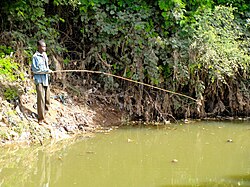
Back Gemeingut German Bien común (economía) Spanish Bien commun French Risorse comuni Italian 공유 자원 (경제학) Korean Collectief goed Dutch Wspólne zasoby Polish Common good (economics) SIMPLE 共有財 Chinese
This article needs additional citations for verification. (May 2015) |

Common goods (also called common-pool resources[1]) are defined in economics as goods that are rivalrous and non-excludable. Thus, they constitute one of the four main types based on the criteria:
- whether the consumption of a good by one person precludes its consumption by another person (rivalrousness)
- whether it is possible to prevent people (consumers) who have not paid for it from having access to it (excludability)
As common goods are accessible by everybody, they are at risk of being subject to overexploitation which leads to diminished availability if people act to serve their own self-interests.
- ^ Mankiw, N.Gregory (2015). Principles of Economics (7th ed.). Cengage Learning, Inc. pp. 215–229. ISBN 978-1-285-16587-5.
© MMXXIII Rich X Search. We shall prevail. All rights reserved. Rich X Search